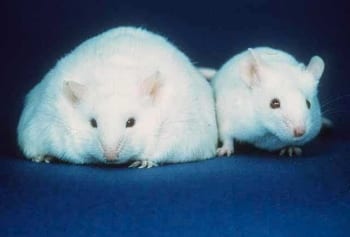
New research in mice suggests that people who get lucky and inherit a genetic variant that has been shown to reduce the risk of type 2 diabetes are not totally in the clear. What they eat could turn the protective variant into a risky one.
PPARG is a protein involved in fat storage. The relatively rare Pro12Ala variant of this gene (which changes the 12th amino acid of the protein from a proline to an alanine) has been associated with reduced weight gain, improved insulin sensitivity and a lower risk for type 2 diabetes in several studies. But these associations are not as strong in obese subjects. Some researchers have actually found that among obese subjects, the Pro12Ala variant is associated with increased — not decreased — weight gain.
A team of scientists from France, Finland and the United States turned to genetically engineered mice to gain insight into this conundrum. Their results, published online today in Cell Metabolism, show that animals with two copies of the Pro12Ala variant are in fact leaner than animals without the variant. They also have improved insulin sensitivity and blood lipid profiles.
But when the mice consumed a diet that provided 58% of its calories as fat, compared to the normal 10% fat diet, the benefits of the Pro12Ala variant disappeared. In fact, the Pro12Ala mice were slightly heavier than the mice without the variant, although the difference was not statistically significant. For comparison, the U.S. Department of Agriculture recommends that humans keep their fat intake between 20 and 35% of total calories; recent CDC data suggest that Americans consume on average about 30 to 35% of their calories as fat.
The mice with the Pro12Ala variant also live longer than the non-variant mice, but only on the normal (not high-fat) diet. The authors note that previous research in humans had suggested that this variant might impact longevity. They suggest that further research be done to investigate the impact of drugs that inhibit PPARG on lifespan.
(23andMe customers can find out if they have the Pro12Ala variant using the Browse Raw Data feature. Each copy of the G version of rs1801282 is a copy of the Pro12Ala variant.)
The researchers suggest that diet affects the PPARG protein’s interactions with hormones and other molecules involved in metabolism. When an animal (mouse or human) eats a normal diet, the proline version of the PPARG protein is more efficient at storing fat than the alanine version. But in animals that take in more energy than they expend, the alanine version of the protein ends up being more pro-fat.
“These data … may provide avenues to better, possibly Pro12Ala genotype-dependent, treatment strategies for insulin resistance in T2DM and the metabolic syndrome,” the authors write.
The results may also help people prevent these disorders in the first place.
“Through dietary counseling, carriers could be informed that they really need to watch out for high fat in their diets,” said the study’s senior author Johan Auwerx in a statement.



